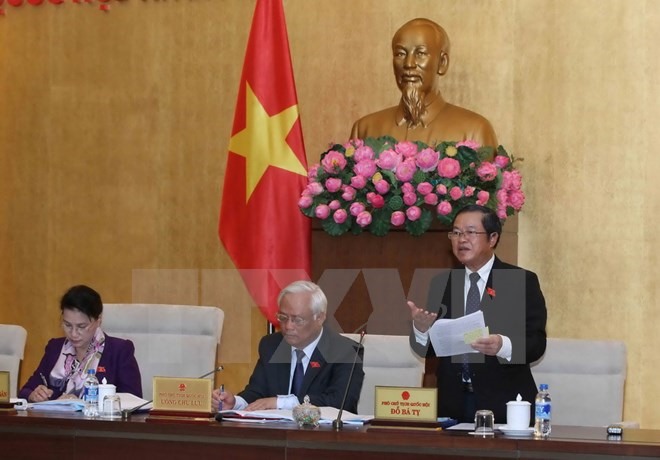 Politics & Law
Politics & Law

The 14th National Assembly Standing Committee (NASC) convened its eighth session yesterday with debates focusing on amendments to the draft Denunciation Law.
 |
| The 14th National Assembly Standing Committee (NASC) convened its eighth session yesterday with debates focusing on amendments to the draft Denunciation Law. — VNA/VNS Photo Phương Hoa |
HÀ NỘI — The 14th National Assembly Standing Committee (NASC) convened its eighth session yesterday with debates focusing on amendments to the draft Denunciation Law.
NA chairwoman Nguyễn Thị Kim Ngân said that during the six-working day meeting, the NASC would discuss revised versions of nine laws - Tourism, Railway, Technology Transfer, Planning, Foreign Trade Management, Aquaculture, Forest Protection and Development, Public Debt Management and Denunciation.
The committee also expected to approve resolutions on forms of legal documents and regulations relating to the work of NA deputies.
The committee members planned to discuss the draft resolution on co-operation among NASC, Government and Việt
They will also examine regulations on fines for violations relating to foreign affairs and international co-operation.
Anonymous denunciations
Government Chief Inspector, Phan Văn Sáu said at the meeting that the 2011 Law on Denunciation needs amendments because of its shortcomings, including those relating to jurisdiction, handling denunciations, procedures and reaching conclusions in denunciation cases.
The amendments also aim to realise new constitutional regulations on human rights and fundamental rights of citizens.
Draft law additions have helped the Party strengthen the effectiveness of denunciation settlement and in the fight against corruption.
Under the draft, controversial issues remain, especially those relating to anonymous denunciations and forms of denunciation.
Sáu said that the Government preferred written denouncing forms and direct denunciations to identify responsibilities of denunciators to avoid misuses of denunciations and inaccurate denunciations.
Others wanted denunciations to also be announced by fax, email or phone so cases are addressed in a timely fashion.
The draft compilers suggested anonymous denunciations should not be accepted as if an inaccurate denunciation was sent, there would be no basis to punish the anonymous sender.
Sáu also said State agencies solved just 87.4 per cent of onymous denunciations in the last few years and nearly 60 per cent of the solved cases featured inaccurate denunciations.
“If anonymous denunciations are lawfully accepted, relevant agencies will face difficulties with their workload,” Sáu said.
Head of the NA’s Legal Committee Nguyễn Khắc Định said after assessing the draft law, some members of the legal committee agreed that the regulation on anonymous denunciation needed more consideration and should not be added to the revised law now.
However, others said that anonymous denunciations enclosed with detailed documents, photos, sound or video recordings should be accepted and verified, Định said.
Head of NA Justice Committee Lê Thị Nga said according to Việt
Nga called for consistency between the two laws.
NA chairwoman Ngân agreed with Nga, adding that Việt Nam was developing e-Government with improved information technology.
Ngân said other forms of denunciations – email, fax, phones and SMS are accepted only when sent directly to authorised agencies.
She also noted that anonymous denunciations with detailed evidence should be considered, as at a minimum they are clues for agencies to investigate the accusations.
Tourism failure
The NASC members spent yesterday afternoon discussing draft revisions to the Law on Tourism.
NA Chairwoman Ngân said that from reading the document, she felt that the country had so far only paid attention to developing tourism in urban areas, and failed to link it with tourism in mountainous or rural areas, and the development of new-style rural areas.
“Our country has many beautiful landscapes which can be compared to sleeping beauties that have not been awakened.
“The recent Hollywood blockbuster Kong:Skull Island has just woken up part of the potential. There remain many other sleeping beauties,” Ngân said.
She cited as an example the fact that visitors from all over the world go to Japan to enjoy the cherry blossom, while hardly anyone knows about the beautiful ban (mountain-ebony) flower forests in Việt Nam’s north-western region.
She said tourism should be closely intertwined with rural areas. Any changes to the Law on Tourism should consider attaching tourism development to new-style rural area development programmes and specialty products of each locality.
“Residents can develop home-stay tourism as foreign tourists like to stay with locals while travelling,” she noted.
Meanwhile, she said, the State would develop things at the macro level like building roads, planting flowers, ensuring environmental cleanliness and food safety.
Senior Lieutenant-General Võ Trọng Việt, chairman of the NA Committee on National Defence and Security, said the tourism industry lacked synchronous solutions.
Việt mentioned the recent fuss on social media over the comment of Jordan Vogt-Roberts, director of Kong: Skull Island and recently-appointed Việt Nam Tourism Ambassador, that there is nowhere else that has landscapes as beautiful as Việt Nam.
“That denotes a paradox. The world may have less beautiful landscapes but they know how to make them beautiful. On the other hand, we have beautiful ones, but we have either destroyed or ‘concreted’ them.
“Many foreigners say Việt Nam is attractive. But we have failed to exploit our strengths.
“We need to create breakthroughs to develop our country’s tourism,” he said. — VNS




